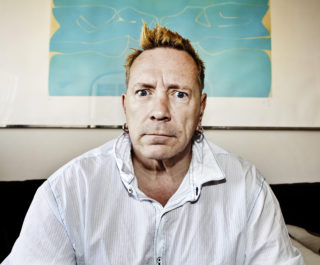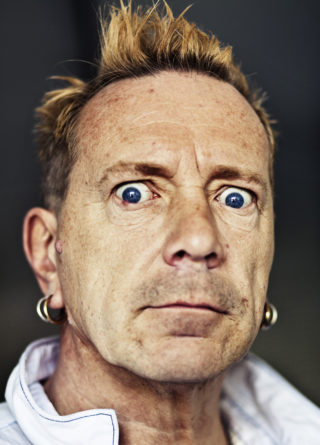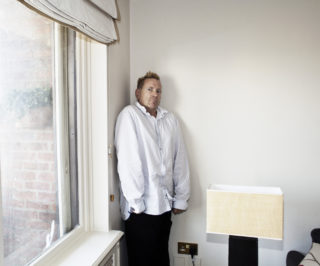John Lydon discusses Ghandi, racism, X Factor, life and those butter adverts
As PiL release their first original material in 20 years, Daniel Dylan Wray finds John Lydon to be not quite what he expected

As PiL release their first original material in 20 years, Daniel Dylan Wray finds John Lydon to be not quite what he expected
In my years as a music writer I have interviewed and encountered all kinds of bands and artists, from fresh-faced teenagers catapulted to fame and worldwide touring by the instantaneous times we live in, to life-long musical heroes who have had forty-plus-year careers and have been responsible for changing the history of modern music. However, for all the varying sense of excitement, trepidation and inquisitiveness I have felt prior to these meetings, I have never gone into an interview with such a feeling of the unknown as I have today. Will I encounter the insightful, witty and sincere John Lydon as seen during his most open and frank interview on the ‘PiL Special’ Culture Show when interviewed by Andrew Graham-Dixon? Or will I encounter the snotty, petulant and sneering John Lydon that displays nothing but boredom and disdain towards his interviewers, like he did towards Bill Grundy or Tom Snyder many years ago? The odds don’t look good.
‘Metal Box’ – Public Image Ltd’s second album; their 1979 masterpiece – somehow sounds ahead of its time even today. Screeching, twisting guitars howl; thick, heavy and pulverising bass lines grumble and roll with machine-like fluidity; unpredictable, manic drums and cadences spark with intense fury. And then there’s the vocals – a warped, raging embodiment of the avant-garde.
The beauty and indeed the oddity of John Lydon’s voice lie in his ability to simultaneously exist at conflicting ends of human emotion. On one hand he sounds deranged and manic, a human being on the edge, almost brittle, something so close to snapping, exploding or melting that the pressure and friction is tangible throughout his wired screams and yowls – so much so that they don’t so much affect as haunt you. On the other, he transcends all of this, at times, by simply sounding not human at all. He’s otherworldly and animalistic, like an undiscovered, unfathomable creature found in the basement of an abandoned laboratory, next to a puddle of sickly green ooze.
Listening to ‘Metal Box’, it dawns on me that in order to try and prepare a coherent and linear approach to this man, listening to one of the most unexplainable and inventive records he (or anybody else) has ever made is perhaps not the way to go about it – the feeling of the unexpected only tends to intensify with ‘Metal Box’. Oh well, sink or swim, I guess…


In glorious Kensington, West London, I’m escorted into the flat of John’s manager, Rambo. He has a deep-set London accent and is sporting a PiL t-shirt and a pink stripe in his hair. John hovers in the background watching television. As our photographer Phil gets set up, he politely enquires about going outside for some photos, which is met with a rather direct “No”. For a moment, I have a terrible feeling that this is going to go sour. As it transpires, I couldn’t be more wrong. I sit down with John, who is so polite he would rather let his lunch get cold than accept my offer to come back in half an hour, once he’s eaten.
He sits down, legs spread far apart, hunched over and leaning in toward me, a cigarette burning in his finger tips. The pale, scrawny Johnny Rotten of years ago is a far removed sight from this guy. John, now 56, is a staunch, bulky gentleman, his rather huge, protruding shoulders some kind of symbolic mutation and result of the sheer weight, pressure and expectation he has carried upon them over the years. The wild eyes still remain and that devilish laugh is ever-present throughout our time together. And the reason we’re here, mainly, is because of PiL’s new material, their first in two decades.
April 21st sees a vinyl-only Record Store Day release of a new EP called ‘One Drop’. It’ll be followed by ‘This Is PiL’, the band’s ninth album, on May 28th. Both will be released by the band’s own label (PiL Official Ltd) for the first time, creating a complete circular realisation of the original idea and concept of PiL being a company.
The newly found independence for John has been a liberating experience.
“It’s a world of difference. It’s been fantastically rewarding,” he beams enthusiastically. “You cannot imagine how punishingly gruelling it is to have a record company come down and be like, ‘yeah, well it all sounds very different but have you got any hit records on it?’ I’ve always kind of been in advance of what a record company considers a hit record, because I’ve made hit records constantly but [I’ve done it] by not being involved in that ridiculously mundane process.”
John’s frustration with his old labels is well known, and he continues to tell me “it was very, very upsetting to me when Virgin and EMI would make things really hard for what we were trying to achieve. But then they’d sign bands up within a year or two that wanted to be like PiL and then they’d put a lot of time and money into that and leave us roasting,” he says. “That’s happened over and over again, and it was just time to say, ‘no thank you, bye bye’.”
Nearly twenty years since the last new material from PiL, John has been more than aware of the potential dangers of creating a new album with the band.
“I’ve very much enjoyed the risk factor that this could all go horribly wrong,” he admits. “There was such a gap between the last PiL record and this, we didn’t know if we’d be able to stay true to ourselves or end up parodying ourselves, which is always a possibility everybody faces. But that didn’t happen – good things happened.” John later tells me of his ability to reflect rather objectively on his work, which may have led to these good things. “I don’t know whether or not it’s to do with the horrible childhood illnesses and coma’s I had [John spent a year in hospital at the age of seven after contracting spinal meningitis, he has since said that he had to learn everything from scratch again, even down to remembering and accepting who his parents were], but I often have a feeling of semi-detachment, being able to look at myself and the work I do from an outside perspective.”
Touring and performing live since their reformation in 2009, this time spent closely with the band (consisting of Lu Edmonds, Bruce Smith and Scott Firth) has built a bond, camaraderie and family unit that John describes as “heaven”, although he admits that “unfortunately, it’s taken me thirty plus years to get to this situation.” But the live shows have been a resounding success. “To my mind, we’re the best live band there is,” he reckons, devilishly adding, “I know there are other bands that would disagree with that, but they’re wrong and I’m right.”
You’d think that PiL would have surely attracted a second generation of fans from these tours, and while they most probably have, it’s not quite as simple as replacing their old audience with new, young punks.
“There’s always been variation in audiences with PiL, and the Sex Pistols, actually, I think because of the intrigue element. There’s never been a mass block of uniformity and I like to see the different cultural aspects of an audience – I thrive on that, it shows that we’re doing something really relevant. Walking out and seeing the first thirty rows of people identical to you is no achievement at all.”
A self-started company and record label doesn’t fund and release records itself, though. It’s been John’s infamous butter adverts that have funded the whole PiL reformation and subsequent album. “Every single penny,” he nods proudly. “No personal gain.
“PiL has always been a labour of love and it always will be,” he continues. “I mean, it’s not a huge amount of money [from the Country Life adverts] but it’s enough to have got us kick started.”
Interestingly, it capsizes the conventional and largely accepted notion of musicians in advertising; one often presuming a state of desperation is in play, or perhaps an addiction needs fulfilling – an insatiable hunger for fame or indeed a much more real obsession (see John Cooper Clarke hawking Sugar Puffs in the ’80s to feed his heroin habit), but John is perhaps the sole example of someone using it to directly fund their art. It arguably reshapes the supposed fundamentals of the ‘sell-out’ debate, if indeed you care at all. John Lydon, the poster boy of punk, selling butter – many of us were appalled. Initially, it was a situation he felt forced into.
“[The record labels] kept me bankrupt for years and years and years and made it impossible for me to function as an artist,” he explains, “which drove me into TV land, more or less.
“When I first started, the TV cameras would make me absolutely terrified and very self-conscious and push me into a role I didn’t want to play,” he tells me. “But as the years moved on, I felt more confident in myself, knowing that I had a body of work behind me that could back up anything I had to say or do. So I didn’t feel the need to prove, or over-prove myself. Now, with the camera on or off, it’s the same amount of tension. Oddly enough, things like I’m A Celebrity… Get Me Outta Here helped because there is really no time to be vain. Vanity will lead to a very uncomfortable existence in that kind of world. That’s why I liked it. And oddly enough, people seemed to like me because I was just myself.”

In the two decades that PiL have been absent from our stereos and stages, the music industry has perhaps seen more developments than any other. For John Lydon, most have been unwelcome. In reaction to X Factor and the like, for example, he frustratingly states, “those talent shows, really what they are presenting is mimics! Singing other people’s songs, using other people’s ideas, it’s karaoke. Then they throw it back at you and…” John claps his hands like a sea lion. “…arf, arf!
“That’s not the future,” he insists. “In fact, it’s a review show; it’s the past without the original entertainers. It takes a lot to write a song, it’s a very serious, deeply emotional journey – even a lousy song requires a lot of effort. It’s not nice to see someone come along and hop on top of that and murder it in that show-bizzy way. I think it’s cold and indifferent, almost vindictive and resentful to creativity. Simon Cowell has a lot to answer for; he’s a very bad person.”
Perhaps we need ‘This Is PiL’ more than ever. Thankfully, it’s an album that very much feels like a natural evolution for the group. Unsurprisingly, it continues to take in a collection of sounds, textures and influences spanning an array of other cultures and races, much like PiL’s entire back catalogue. “That’s because I see all music as coming from the same place – the heart,” says John, earnestly.
Growing up in the hugely multi-racial Finsbury Park area, even in the early Sex Pistols days dub and reggae music had a big impact on John and punk culture as a whole, most commonly accredited to Don Letts’ involvement as a DJ at The Roxy club. So when some groups of misguided punks went down the more narrow-minded, racist route that some sadly did, it proved difficult for John.
“It was disgusting and amazingly frustrating for me,” he says with a sigh. “They were immediately ghettoising and limiting themselves. Ghandi is a great political hero of mine, he managed to get the British Empire out of India, but look what that quickly turned into: civil war. And that was similar to the way the punk movement went. I don’t want to sound too conceited here, because I’m not putting myself forward as Ghandi – I wouldn’t dream of such a thing, he is beyond belief to me, one of the ultimate human beings that this planet has ever created – but I can see the link. You start out with all the right motivations and you want the seed to germinate, and instead the germs get in and poison the roots. It’s a shame, but you have to go forth, I can’t be held responsible for everyone’s bad moves, or even the good ones.”
Was it something of a personal let down?
“No, you know what, God bless them all, because I don’t come into this world having the audacity of expectation from others. This is what I do, you can like it or you can lump it, but it would be nice if you understood it.”
It leads me to tentatively question: the allegations made by Kele Okereke of Bloc Party, that in 2008 John and members of his entourage undertook a physical and verbal racial attack on him, which, on paper, is a complete contradiction to everything John seems to stand for.
“He was trying to sell a record off my back,” John says. “People get used to this world of The Sun, The Daily Mirror and the Murdoch empire nonsense and they fall into it without even realising it. They knew they couldn’t pursue any such nonsense because it was ungrounded, pointless and trivial, and they kind of humiliated themselves. They did it without fully understanding my own family and my own background and my own social status. They must have presumed I was some kind of whatever and that was that.” John stops and pauses before sadly and sombrely stating: “They hurt a lot of my family, very much. My Jamaican grandkids were horrified at reading that, it upset them deeply. I mean it’s my family, we’re multi-racial, same as my friends, always has been, always will be. You can bandy the racism slant around so easily these days and you don’t have to justify it, and I’d like to see a payback on that. If you put up a false accusation you should also put up the price that comes with it. But I hold no animosity, life’s too short, I’m not in this world to perpetuate enemies.”
A recurring theme during our conversation is that of misrepresentation. We thought John Lydon was a brat. A cliché. We thought we’d be able to predict his answers before asking the questions. That’s how he’s always been seen, in the public (or press’) eye.
“It has been bugging me for years,” he says, “people writing nonsense about me thinking they know who I am and what I stand for.” It’s a reason for his very stark, open and resoundingly positive lyrics on the new album, he says.
“For too many years I’ve been labelled as nihilistic or negative and I really am not. I’m not going to sit back and go, ‘oh everything’s awful, why bother?’, because that’s never really been my mentality.
“Squabbling with financial fraudulence has been overwhelming, but it hasn’t turned me into a sour puss.”
But you have played the character, though.
“Well, yes, it’s partly my own fault. I’ve got a great sense of fun in me and I play up to it sometimes and I don’t mind saying so. I do expect people to get the humour of it all, though. It would be so wrong to think The Sex Pistols was a dour, vicious hateful thing – it wasn’t, it was very fun for us. A great sense of innocence and hope for the world, but the media manipulated it to make it whatever they wanted it to be. I think the audience knew better, so it really didn’t matter what the press was saying, but it’s a bit silly when still to this day I get people who ‘filthy and fury’ us. When we reformed in ’96, we used that exact title, ‘the filth and the fury’, just to sling it back. It’s a game, it’s a laugh, but the songs actually mean something and they are about change and improving our lives, not making them worse. I don’t want to riot for no reason.
“In the back of No Irish, No Blacks, No Dogs [John’s autobiography] I think I explained the Sex Pistols very well,” he continues, “which is that we’re funsters. We’re not tricksters and there is a very big difference. It was not a business sham that the likes of poor old Malcolm would want to believe, because he wasn’t an ideas person. So he really had to live and exist in other people’s ideas and then make a career for himself inside that frame.”
This is something John has felt from many others along the years too.
“It didn’t have to be that way,” he says, “it shouldn’t be that way, but however many duffers you come across in life there is an equal number of really brilliant people and that’s what keeps you going and gives you the will to continue.
“Although there are times when I do take it kind of personally when people let me down so bitterly, when I can’t fathom the reason behind it, the resentment is so unnecessary. I’ve helped so many people start music careers that they really should be somewhat grateful. To me, it’s like they’re my babies and then they grow up and they move away from Daddy. I feel sad for them being silly, but they can always come back and be forgiven.”
We talk our way through a winding road of topics, and as our conversation draws to an end, John becomes slightly philosophical and perhaps reflects a little further on the rather antiquated notion of him being someone he’s not. Many people seem to forget that the vitriolic, anarchistic swagger of Johnny Rotten was the living embodiment of a frustrated youth – he was a kid, and what other profession on this entire planet uses your behaviour as a teenager to judge, represent or paint you as the person you are today, even when in your mid-fifties? John ultimately cements the refutation of the idea of him being a solipsistic, nihilistic human being.
“There’s none of that ‘I hope I die before I get old’ with me, I don’t want to die. I don’t know where that goes. I mean, I’ll take it when it comes, you have to, but I love life, in every single way,” he bubbles with rabid enthusiasm before pausing. A fly buzzes and lands on the chair in front of him. He looks deeply and intently at it with his pulsing eyes for a moment. “I mean, I don’t know what makes that fly buzz about, but I love its nature, that little electrical pulse that makes its heart tick, what a great thing that is. I can see the need for religion when we weren’t quite so civilised, but the time for religion is gone and we must start viewing the world in a much more sensible way. Everything that lives is interconnected, it all has that pulse of life and if you just go around with fly spray and exterminate them because they annoy you, that’ll come back to haunt you one way or another. You’re literally killing something that is connected to yourself and that to me is a slow form of suicide, using murder as the tool.” He again pauses and looks at me gravely before his face cracks into a big, wide smirk. “But I draw the line at mosquitos!” We both cackle with laughter. And right there, in that inadvertent metaphor he has stumbled across, is perhaps the most perfect and elegant way to describe John Lydon’s demeanour and indeed career – a moment of deep, inventive, introspective thought that operates on a multi-faceted and philosophical level, suddenly sucker punched by a moment of the unexpected, somewhat contradictory deep, loveable humour. Unsurprisingly, the person best able to sum up the madcap brilliance of John Lydon is the man himself.